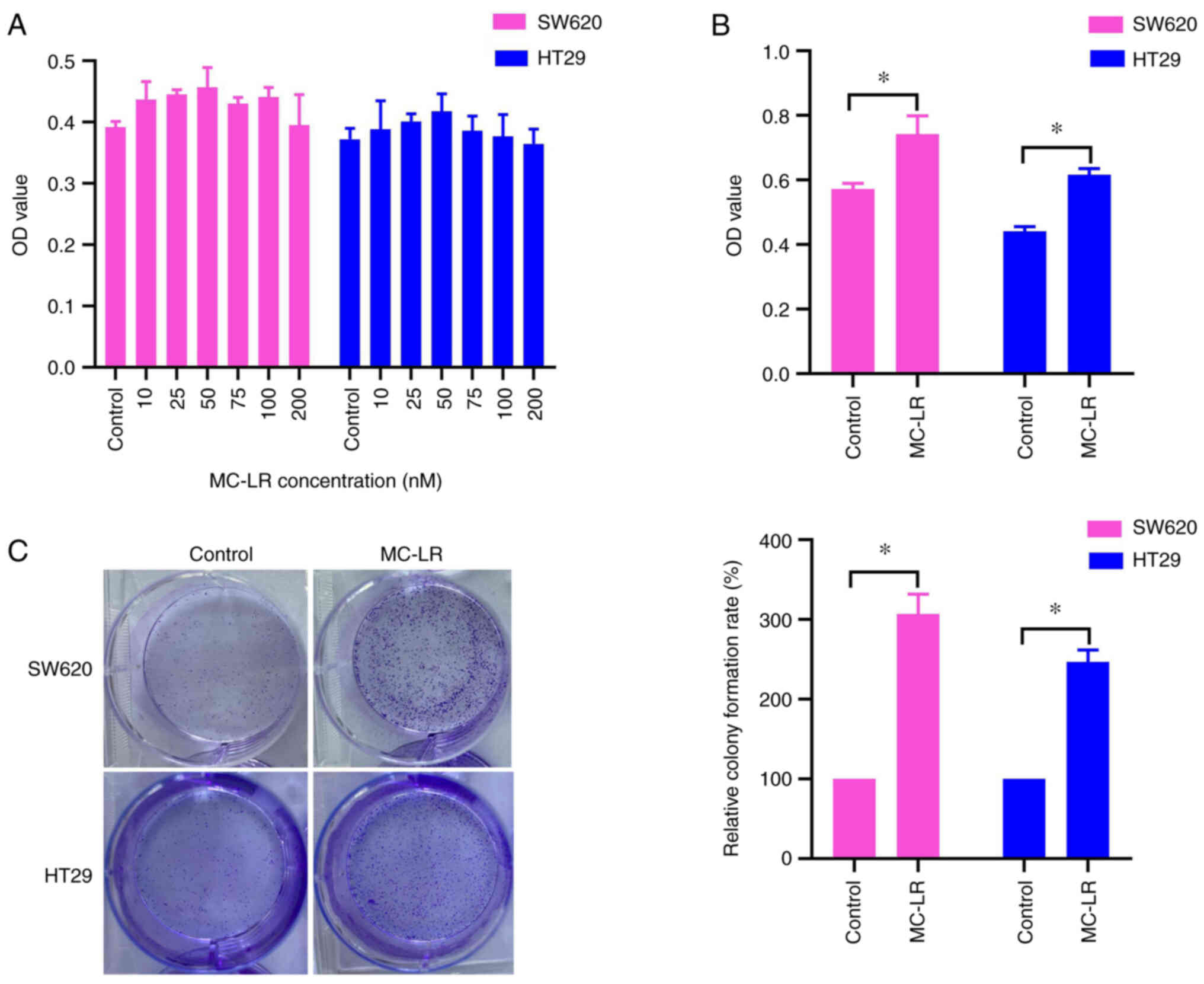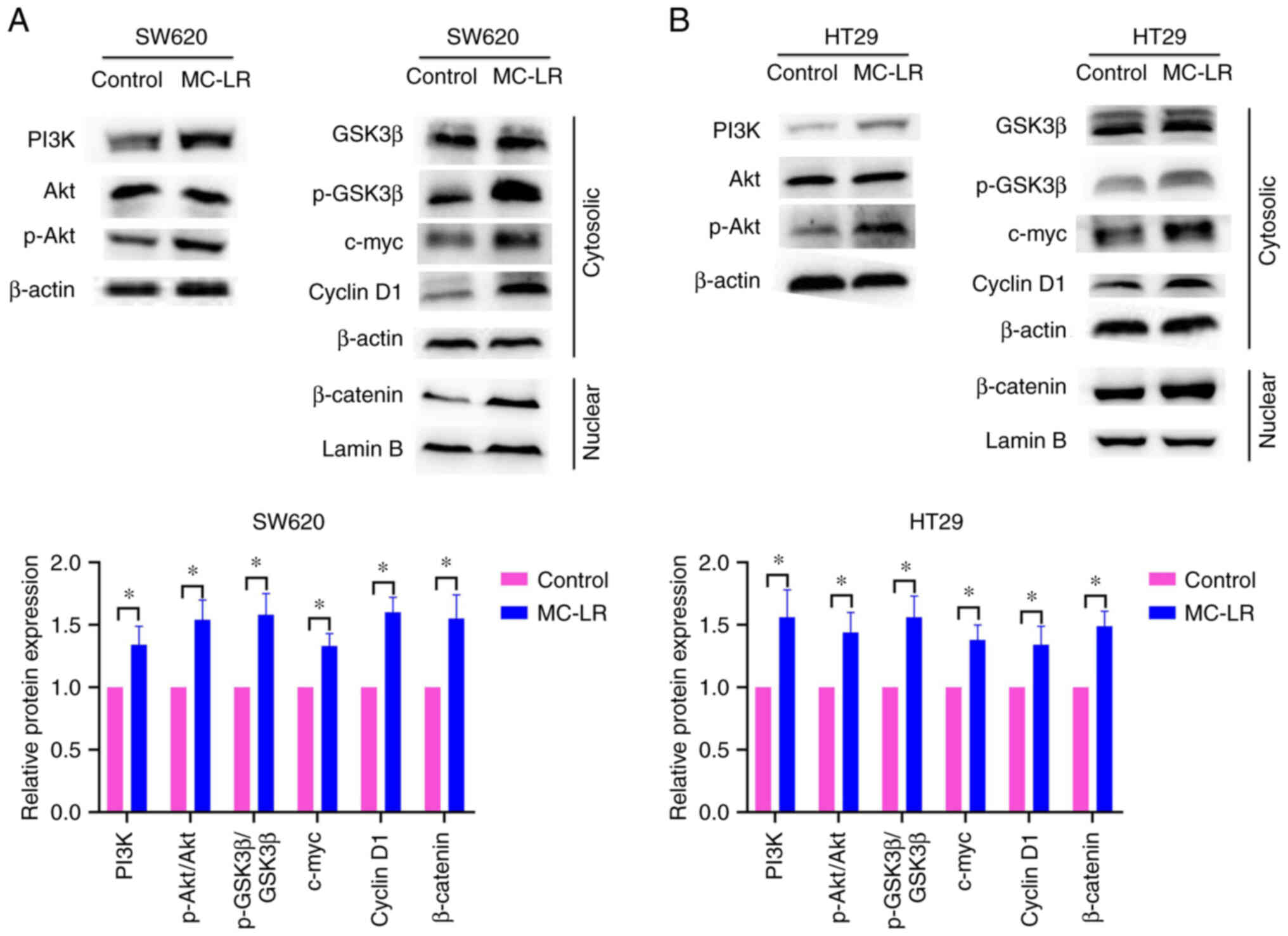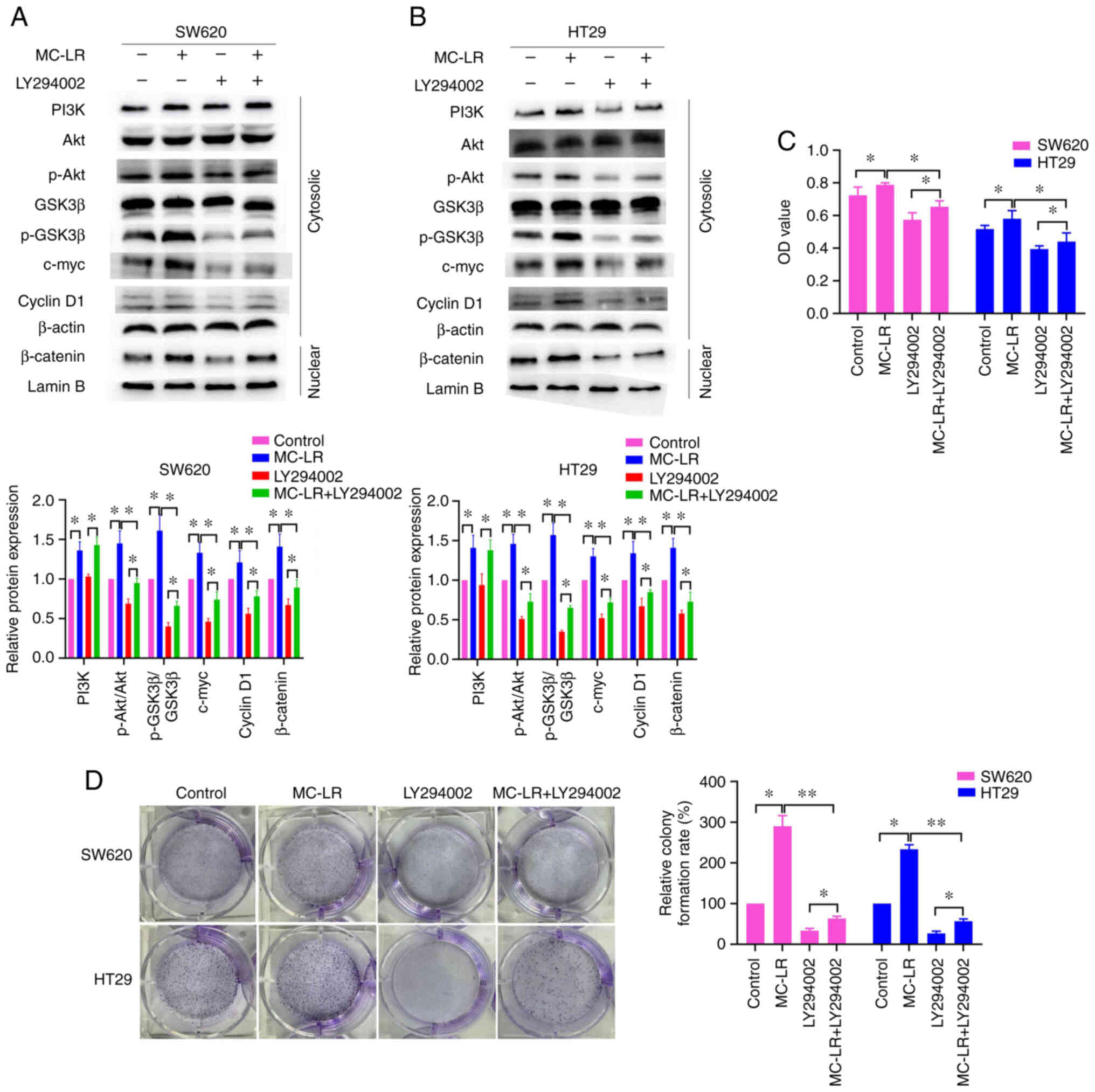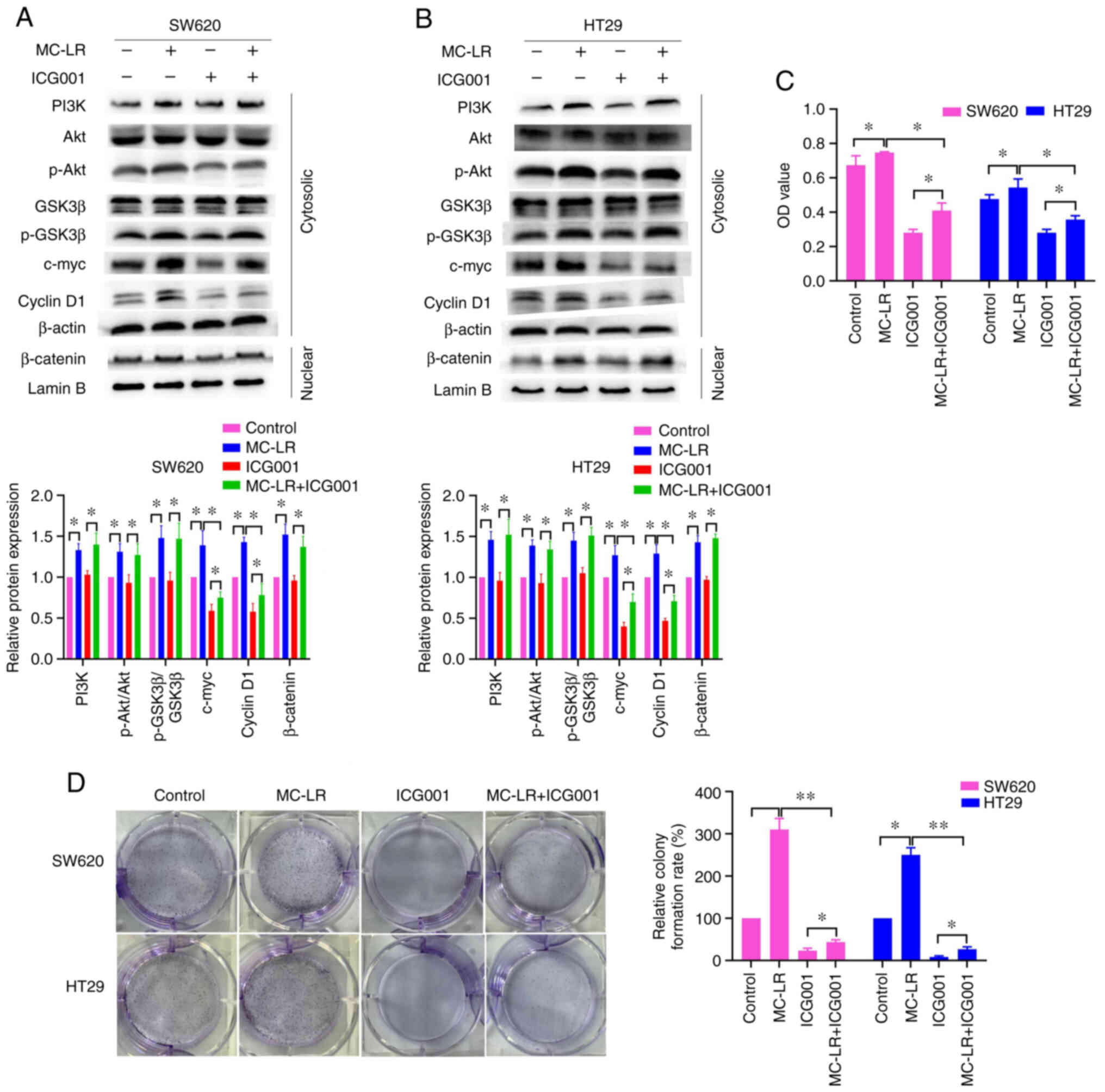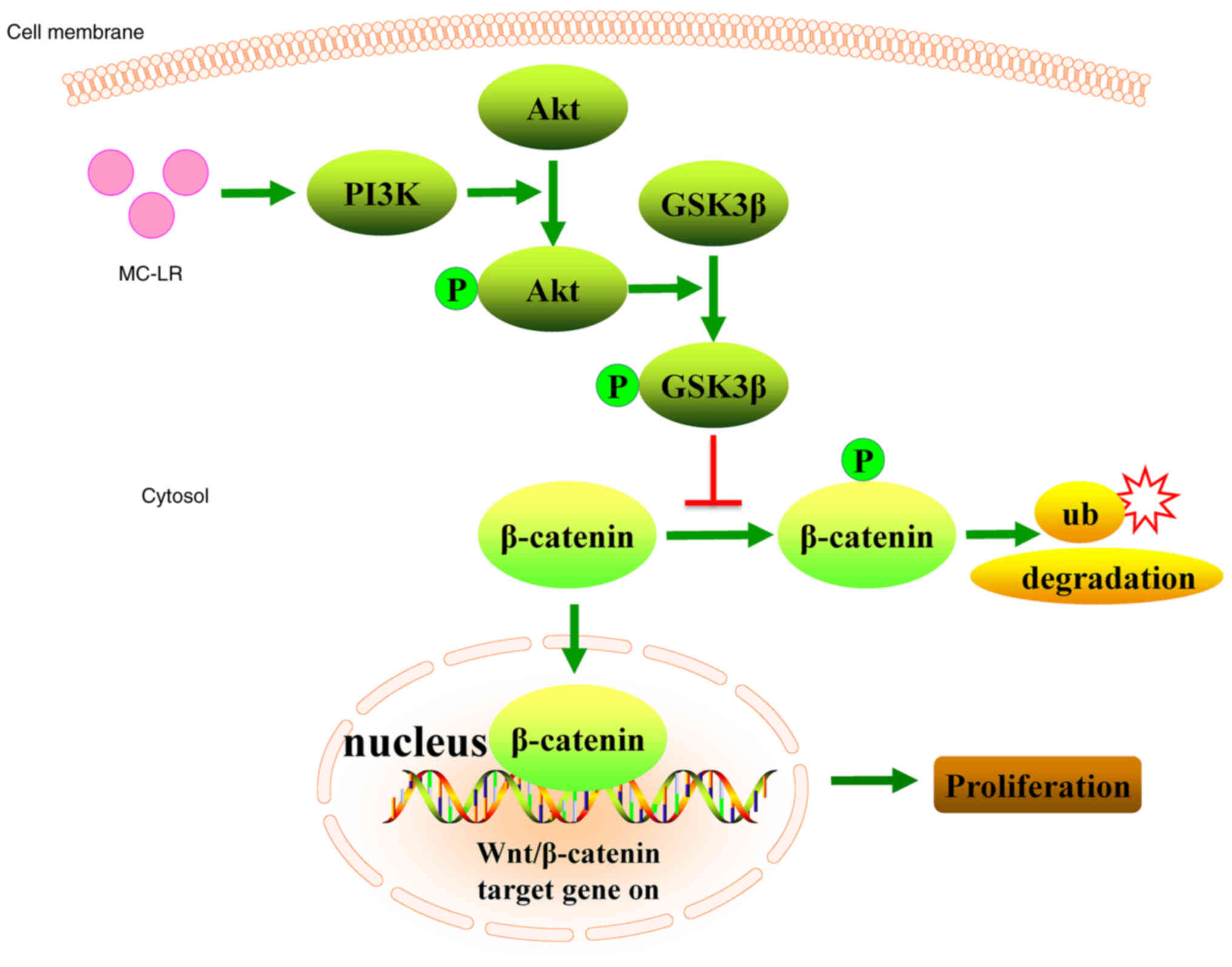|
1
|
Liu H, Guo X, Liu L, Yan M, Li J, Hou S,
Wan J and Feng L: Simultaneous microcystin degradation and
microcystis aeruginosa inhibition with the single enzyme
microcystinase A. Environ Sci Technol. 54:8811–8820. 2020.
View Article : Google Scholar : PubMed/NCBI
|
|
2
|
Zhou S, Yu Y, Zhang W, Meng X, Luo J, Deng
L, Shi Z and Crittenden J: Oxidation of microcystin-LR via
activation of peroxymonosulfate using ascorbic acid: Kinetic
modeling and toxicity assessment. Environ Sci Technol.
52:4305–4312. 2018. View Article : Google Scholar : PubMed/NCBI
|
|
3
|
Cheng R, Zhu H, Shutes B and Yan B:
Treatment of microcystin (MC-LR) and nutrients in eutrophic water
by constructed wetlands: Performance and microbial community.
Chemosphere. 263:1281392021. View Article : Google Scholar : PubMed/NCBI
|
|
4
|
Sotton B, Guillard J, Anneville O,
Maréchal M, Savichtcheva O and Domaizon I: Trophic transfer of
microcystins through the lake pelagic food web: Evidence for the
role of zooplankton as a vector in fish contamination. Sci Total
Environ. 466:152–163. 2014. View Article : Google Scholar : PubMed/NCBI
|
|
5
|
Zhang Q, Wang G, Xie Y, Gao Z, Liang Z,
Pan Z, Wang G and Feng W: Mechanical changes and microfilament
reorganization involved in microcystin-LR-promoted cell invasion in
DU145 and WPMY cells. Front Pharmacol. 11:892020. View Article : Google Scholar : PubMed/NCBI
|
|
6
|
Pan C, Chen Y, Xu T, Wang J, Li D and Han
X: Chronic exposure to microcystin-leucine-arginine promoted
proliferation of prostate epithelial cells resulting in benign
prostatic hyperplasia. Environ Pollut. 242:1535–1545. 2018.
View Article : Google Scholar : PubMed/NCBI
|
|
7
|
Duong TT, Jähnichen S, Le TPQ, Ho CT,
Hoang TK, Nguyen TK, Vu TN and Dang DK: The occurrence of
cyanobacteria and microcystins in the Hoan Kiem Lake and the Nui
Coc reservoir (North Vietnam). Environ Earth Sci. 71:2419–2427.
2014. View Article : Google Scholar
|
|
8
|
Xiao C, Mei F, Ren G, Long L, Chen M, Fang
X, Li J, Li K, Tang Y, Huang T and Deng W: Synergistic effect of
MC-LR and C-terminal truncated HBx on HepG2 cells and their effects
on PP2A mediated downstream target of MAPK signaling pathway. Front
Genet. 11:5377852020. View Article : Google Scholar : PubMed/NCBI
|
|
9
|
Fujiki H and Suganuma M: Tumor
promoters-microcystin-LR, nodularin and TNF-α and human cancer
development. Anticancer Agents Med Chem. 11:4–18. 2011. View Article : Google Scholar : PubMed/NCBI
|
|
10
|
Zhang Z, Zhang XX, Qin W, Xu L, Wang T,
Cheng S and Yang L: Effects of microcystin-LR exposure on matrix
metalloproteinase-2/-9 expression and cancer cell migration.
Ecotoxicol Environ Saf. 77:88–93. 2012. View Article : Google Scholar : PubMed/NCBI
|
|
11
|
He L, Huang Y, Guo Q, Hui Z, Zheng C, Wang
J, Chen JA, Wang L and Shu W: Chronic microcystin-LR exposure
induces hepatocarcinogenesis via increased gankyrin in vitro and in
vivo. Cell Physiol Biochem. 49:1420–1430. 2018. View Article : Google Scholar : PubMed/NCBI
|
|
12
|
Harada S and Morlote D: Molecular
pathology of colorectal cancer. Adv Anat Pathol. 27:20–26. 2020.
View Article : Google Scholar : PubMed/NCBI
|
|
13
|
Long J, He Q, Yin Y, Lei X, Li Z and Zhu
W: The effect of miRNA and autophagy on colorectal cancer. Cell
Prolif. 53:e129002020. View Article : Google Scholar : PubMed/NCBI
|
|
14
|
Miao C, Ren Y, Chen M, Wang Z and Wang T:
Microcystin-LR promotes migration and invasion of colorectal cancer
through matrix metalloproteinase-13 up-regulation. Mol Carcinog.
55:514–524. 2016. View
Article : Google Scholar : PubMed/NCBI
|
|
15
|
Ren Y, Yang M, Meng C, Zhu Q, Zhou L, Qin
W and Wang T: Microcystin-LR promotes epithelial-mesenchymal
transition in colorectal cancer cells through PI3-K/AKT and SMAD2.
Toxicol Lett. 265:53–60. 2017. View Article : Google Scholar : PubMed/NCBI
|
|
16
|
He XS, Ye WL, Zhang YJ, Yang XQ, Liu F,
Wang JR, Ding XL, Yang Y, Zhang RN, Zhao YY, et al: Oncogenic
potential of BEST4 in colorectal cancer via activation of PI3K/Akt
signaling. Oncogene. 41:1166–1177. 2022. View Article : Google Scholar : PubMed/NCBI
|
|
17
|
Zhao H, Ming T, Tang S, Ren S, Yang H, Liu
M, Tao Q and Xu H: Wnt signaling in colorectal cancer: Pathogenic
role and therapeutic target. Mol Cancer. 21:1442022. View Article : Google Scholar : PubMed/NCBI
|
|
18
|
Wu C, Wang M and Shi H: Cholesterol
promotes colorectal cancer growth by activating the PI3K/AKT
pathway. J Oncol. 2022:15154162022.PubMed/NCBI
|
|
19
|
Zhang Q, Fei S, Zhao Y, Liu S, Wu X, Lu L
and Chen W: PUS7 promotes the proliferation of colorectal cancer
cells by directly stabilizing SIRT1 to activate the Wnt/β-catenin
pathway. Mol Carcinog. Oct 12–2022.(Epub ahead of print).
View Article : Google Scholar
|
|
20
|
Han R, Zhang L, Gan W, Fu K, Jiang K, Ding
J, Wu J, Han X and Li D: piRNA-DQ722010 contributes to prostate
hyperplasia of the male offspring mice after the maternal exposed
to microcystin-leucine arginine. Prostate. 79:798–812. 2019.
View Article : Google Scholar : PubMed/NCBI
|
|
21
|
Huang X, Chen L, Liu W, Qiao Q, Wu K, Wen
J, Huang C, Tang R and Zhang X: Involvement of oxidative stress and
cytoskeletal disruption in microcystin-induced apoptosis in CIK
cells. Aquat Toxicol. 165:41–50. 2015. View Article : Google Scholar : PubMed/NCBI
|
|
22
|
Pan C, Zhang L, Meng X, Qin H, Xiang Z,
Gong W, Luo W, Li D and Han X: Chronic exposure to microcystin-LR
increases the risk of prostate cancer and induces malignant
transformation of human prostate epithelial cells. Chemosphere.
263:1282952021. View Article : Google Scholar : PubMed/NCBI
|
|
23
|
Liang Z, Mou Q, Pan Z, Zhang Q, Gao G, Cao
Y, Gao Z, Pan Z and Feng W: Identification of candidate diagnostic
and prognostic biomarkers for human prostate cancer: RPL22L1 and
RPS21. Med Oncol. 36:562019. View Article : Google Scholar : PubMed/NCBI
|
|
24
|
Feng W, Zhang M, Wu ZX, Wang JQ, Dong XD,
Yang Y, Teng QX, Chen XY, Cui Q and Yang DH: Erdafitinib
antagonizes ABCB1-mediated multidrug resistance in cancer cells.
Front Oncol. 10:9552020. View Article : Google Scholar : PubMed/NCBI
|
|
25
|
He S and Tang S: WNT/β-catenin signaling
in the development of liver cancers. Biomed Pharmacother.
132:1108512020. View Article : Google Scholar : PubMed/NCBI
|
|
26
|
Li F, Xie W, Fang Y, Xie K, Liu W, Hou L
and Tan W: HnRNP-F promotes the proliferation of bladder cancer
cells mediated by PI3K/AKT/FOXO1. J Cancer. 12:281–291. 2021.
View Article : Google Scholar : PubMed/NCBI
|
|
27
|
Zhu Q, Zhang X, Zai HY, Jiang W, Zhang KJ,
He YQ and Hu Y: circSLC8A1 sponges miR-671 to regulate breast
cancer tumorigenesis via PTEN/PI3k/Akt pathway. Genomics.
113:398–410. 2021. View Article : Google Scholar : PubMed/NCBI
|
|
28
|
Li K, Zhang J, Tian Y, He Y, Xu X, Pan W,
Gao Y, Chen F and Wei L: The Wnt/β-catenin/VASP positive feedback
loop drives cell proliferation and migration in breast cancer.
Oncogene. 39:2258–2274. 2020. View Article : Google Scholar : PubMed/NCBI
|
|
29
|
Li K, Huang M, Xu P, Wang M, Ye S, Wang Q,
Zeng S, Chen X, Gao W, Chen J, et al: Microcystins-LR induced
apoptosis via S-nitrosylation of GAPDH in colorectal cancer cells.
Ecotoxicol Environ Saf. 190:1100962020. View Article : Google Scholar : PubMed/NCBI
|
|
30
|
Liu J, Wang H, Wang B, Chen T, Wang X, Pu
H, Xu L and Guo Z: Microcystin-LR promotes proliferation by
activating Akt/S6K1 pathway and disordering apoptosis and cell
cycle associated proteins phosphorylation in HL7702 cells. Toxicol
Lett. 240:214–225. 2016. View Article : Google Scholar : PubMed/NCBI
|
|
31
|
Jia X, Guan B, Liao J, Hu X, Fan Y, Li J,
Zhao H, Huang Q, Ma Z, Zhu X, et al: Down-regulation of GCLC is
involved in microcystin-LR-induced malignant transformation of
human liver cells. Toxicology. 421:49–58. 2019. View Article : Google Scholar : PubMed/NCBI
|
|
32
|
Yan M, Gu S, Pan C, Chen Y and Han X:
MC-LR-induced interaction between M2 macrophage and biliary
epithelial cell promotes biliary epithelial cell proliferation and
migration through regulating STAT3. Cell Biol Toxicol. 37:935–949.
2021. View Article : Google Scholar : PubMed/NCBI
|
|
33
|
Liu J, Wang B, Huang P, Wang H, Xu K, Wang
X, Xu L and Guo Z: Microcystin-LR promotes cell proliferation in
the mice liver by activating Akt and p38/ERK/JNK cascades.
Chemosphere. 163:14–21. 2016. View Article : Google Scholar : PubMed/NCBI
|
|
34
|
Wang H, Xu K, Wang B, Liu J, Wang X, Xing
M, Huang P, Guo Z and Xu L: Microcystin-LR induces a wide variety
of biochemical changes in the A549 human non-small cell lung cancer
cell line: Roles for protein phosphatase 2A and its substrates.
Environ Toxicol. 32:1065–1078. 2017. View Article : Google Scholar : PubMed/NCBI
|
|
35
|
Noorolyai S, Shajari N, Baghbani E,
Sadreddini S and Baradaran B: The relation between PI3K/AKT
signalling pathway and cancer. Gene. 698:120–128. 2019. View Article : Google Scholar : PubMed/NCBI
|
|
36
|
Yan G, Ru Y, Wu K, Yan F, Wang Q, Wang J,
Pan T, Zhang M, Han H, Li X and Zou L: GOLM1 promotes prostate
cancer progression through activating PI3K-AKT-mTOR signaling.
Prostate. 78:166–177. 2018. View Article : Google Scholar : PubMed/NCBI
|
|
37
|
Clevers H: Wnt/beta-catenin signaling in
development and disease. Cell. 127:469–480. 2006. View Article : Google Scholar : PubMed/NCBI
|
|
38
|
Han X, Wu P, Li L, Sahal HM, Ji C, Zhang
J, Wang Y, Wang Q, Qian H, Shi H and Xu W: Exosomes derived from
autologous dermal fibroblasts promote diabetic cutaneous wound
healing through the Akt/β-catenin pathway. Cell Cycle. 20:616–629.
2021. View Article : Google Scholar : PubMed/NCBI
|
|
39
|
Zheng K, Bai J, Li N, Li M, Sun H, Zhang
W, Ge G, Liang X, Tao H, Xue Y, et al: Protective effects of
sirtuin 3 on titanium particle-induced osteogenic inhibition by
regulating the NLRP3 inflammasome via the GSK-3β/β-catenin
signalling pathway. Bioact Mater. 6:3343–3357. 2021. View Article : Google Scholar : PubMed/NCBI
|















